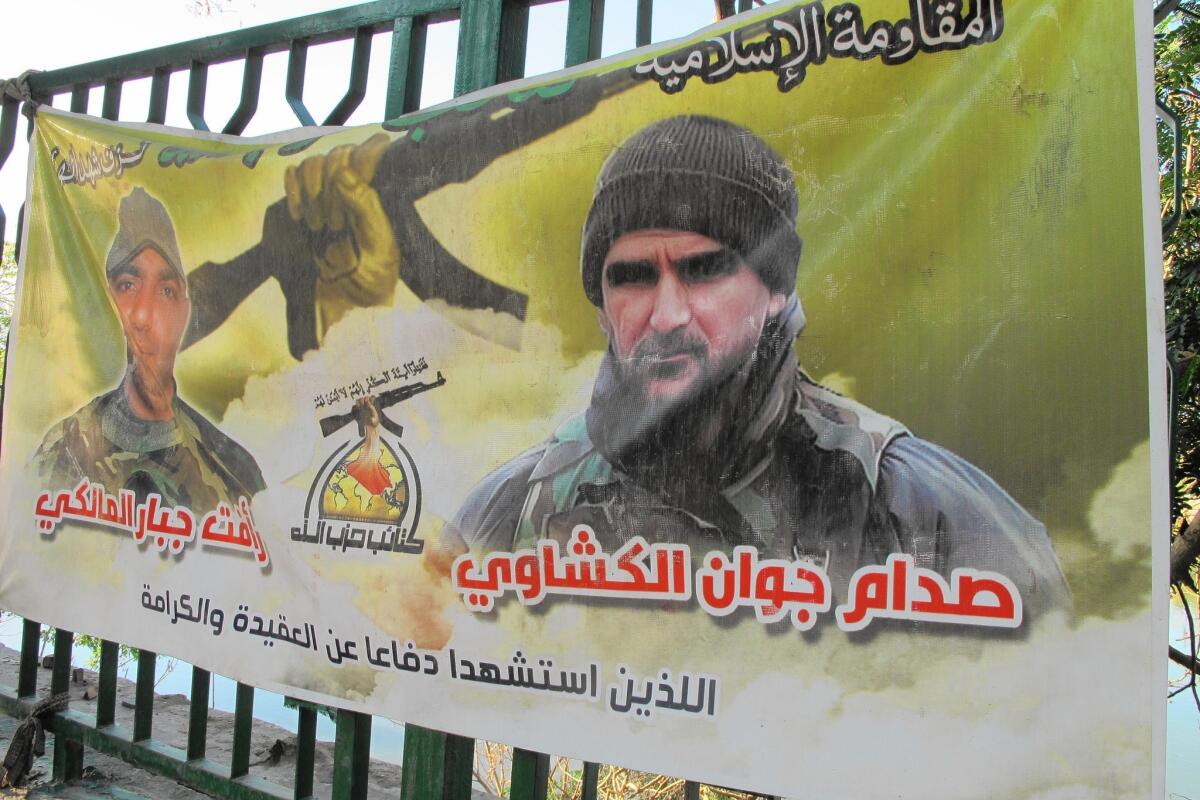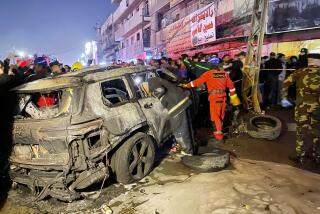In Iraq, Shiite militias are both friend and foe

Abu Karar, an eager Shiite Muslim militiaman, is willing to fight alongside the Iraqi army against Islamic State militants. But he is not counting on the army for much support in battle.
“If we get attacked, we look to them for help but they never come. We’re always left on our own,” the 20-year-old, wearing a military camouflage cap, said in his living room in Baghdad, the Iraqi capital.
Like many Iraqis, Karar believes the will and determination to hold off Islamic State advances will not come from Iraq’s weak and fractured army. Instead, Iraq’s most effective fighting forces may be the highly motivated Shiite militias that have mobilized to counter Sunni-led Islamic State fighters.
The militias rose to prominence in the army and police under former Prime Minister Nouri Maliki, a Shiite who resigned under pressure in August and was replaced by the less divisive Haider Abadi.
Karar and other Shiite militiamen are supporting the army in battles against Islamic State in Anbar province, west of Baghdad. But the militias’ power center is the predominantly Shiite capital, where they, in concert with Shiite-led police units, rule Shiite neighborhoods.
“The reason Daesh doesn’t take Baghdad is because of us,” said Naeem Aboudi, spokesman for the powerful Asaib Ahl al Haq militia, using the Arabic acronym for Islamic State. “We have drawn a red line around Baghdad, and anyone who crosses it will be struck by an iron hand.”
Asaib Ahl al Haq, or League of the Righteous, is the largest of four main Shiite militias and four smaller offshoots in Baghdad. Among its thousands of fighters is Karar, who used a nickname because he is not authorized by his commanders to speak with reporters.
The militia was among the leading killers of American troops before the U.S. combat role in Iraq ended in 2011. It’s also one of several Shiite militias accused of kidnapping, torturing and killing Sunnis to avenge support by some Sunnis for Islamic State. In addition, militias have mounted violent, Taliban-style raids on clubs serving liquor.
Aboudi denied allegations in an Amnesty International report this month titled “Absolute Impunity: Militia Rule in Iraq.” It says Shiite militias “are ruthlessly targeting Sunni civilians on a sectarian basis under the guise of fighting terrorism.” Similar accusations were made by Human Rights Watch in July.
By arming and colluding with the militias, “the Iraqi authorities have effectively granted them free rein to go on the rampage against Sunnis,” the Amnesty report says.
The militias pose a challenge for the United States. They have helped prop up the faltering Iraqi army, but at a steep price. In addition to terrorizing Sunnis, they are funded by Iran, an implacable U.S. foe now in an awkward, if unacknowledged, alliance against Islamic State.
Limited to an advisory role, the U.S. military has to bitterly accept militiamen with American blood on their hands. The militias have alienated Sunnis serving in the army, said retired Lt. Gen. James M. Dubik, who trained the Iraqi military in 2007 and 2008.
“The Sunnis are very nervous about this,” said Dubik, who called deploying the militias “a terrible idea.”
The central role of the militias contradicts pledges by Abadi, a Shiite who became prime minister in September, to tamp down sectarianism and share power. But there are doubts that the Shiite-dominated army can halt Islamic State advances without the militiamen, most of whom answer to their commanders, not to the army, analysts say.
“These militias are more focused and organized and effective than the army,” said Dhiaa Asadi, a Shiite member of parliament who supports the militias. “They are coordinating with the army, but they have their own commands.”
The militias have “tens of thousands” of fighters, Asadi said, but they are essentially defensive forces. They also have narrow goals.
“Their main duty is to protect their people and their shrines,” Asadi said.
Militiamen run checkpoints and guard Shiite shrines. Banners mourning militiamen killed in battle adorn walls and homes and the walls of some army compounds.
Brig. Gen. Abdul Ameer Kamil, head of Iraqi military operations in Baghdad, said the surrounding “Baghdad belt” is too vast and porous for the army to defend on its own. He said “volunteers,” as he calls Shiite militiamen, have contributed greatly to what he says is a capital secure from Islamic State advances.
“We need these volunteers very much,” Kamil said.
Jawad Bolani, a Shiite lawmaker and former interior minister, calls militiamen a “new army” that is distinct from the national army but integrated into the standing military. On Friday, the influential Shiite cleric Grand Ayatollah Ali Sistani asked the government to pay all militiamen like regular soldiers.
On Saturday, Iraq’s parliament appointed as interior minister Mohammed Ghabban, a member of the Badr Organization, which fields one of the largest Shiite militias. That further blurred the distinction between militias and the ministry in charge of police and security.
Ghabban is close to Hadi Amiri, leader of the Badr party and militia. Amiri was accused by the U.S. Embassy in a 2009 memo published by WikiLeaks of ordering militia attacks on 2,000 Sunnis between 2004 and 2006. The memo cited allegations that Amiri favored using a power drill on the skulls of his enemies.
In one of many odd alliances created by sweeping Islamic State advances in Iraq this year, some Sunni tribes in Anbar have requested assistance from Shiite militias, according to Shiite politicians.
“The people in Anbar asked for our help and we have gone there to assist them,” Aboudi, 36, said inside the militia’s fortified headquarters in a villa in Baghdad’s Karada neighborhood, dressed in a conservative gray business suit.
“Every inch of this land is sacred, and it’s our duty to defend it, whether it is Shiite or Sunni land,” he said.
Aboudi said militiamen have ferreted out and “arrested” Sunnis accused of operating Islamic State “sleeper cells” in Baghdad. But he denied that the men were killed, saying they were handed over to Iraqi’s Shiite-dominated security forces.
“We have an open mind to the Sunni side,” Aboudi said. “We take a national position on this [Islamic State] threat, not a sectarian position.”
Human rights groups have accused Islamic State militants of kidnapping, torturing and executing Shiites in Syria and Iraq, and selling Shiite women as sex slaves. The militants, who regard Shiites as apostates, have also destroyed Shiite mosques and shrines.
Some analysts worry that the alliance between the Iraqi army and the militias is tenuous. The militias once battled the army, and Asaib Ahl al Haq claimed responsibility for more than 6,000 attacks against U.S. and coalition forces between 2006 and 2011.
If the goals of the army and militias remain aligned, the government can exercise some control, said Charlie Winter, a researcher on Islamic State at the Quilliam Foundation in London, a think tank that studies extremist groups.
“If the militias deem themselves to be marginalized, then they will exercise their ability to take back their political sway,” Winter said.
Analysts say the Iraqi government has tolerated abuses against Sunnis. “Often, these militias employ terrorist tactics reminiscent of IS brutalities — a huge, huge problem,” Winter said, using an abbreviation for Islamic State.
Many Baghdad residents, especially Shiites, have lost faith in the army after three divisions deserted and abandoned their weapons while under attack by Islamic State in the northern city of Mosul. They look to Shiite militias for protection.
“They are strong — stronger now than the army — and they are willing to die to defend Iraq,” said Karrar Jalal, a Shiite who manages a kitchen supply shop in Baghdad.
Aboudi declined to say how many fighters his militia has, but said it has more than enough volunteers.
He said the militia still considers the U.S. its enemy and would attack any U.S. ground forces. President Obama, who has pressured the new prime minister to open the Shiite-dominated government and army to Sunnis and other sects, has ruled out sending ground troops to Iraq, and the Iraqi government has not requested them.
“We’ve had bad experience with the Americans in the past,” Aboudi said. “We still reject them.”
Karar, the militiaman, said that although U.S. and coalition airstrikes have helped degrade Islamic State forces in Anbar, he dislikes being associated with the U.S. military.
He also resents the fact that the army is backed by U.S. advisors and weapons, even though his older brother is a U.S.-trained army corporal. He is too young to have fought the Americans, but wants nothing to do with them.
“I hate them,” he said.
More to Read
Start your day right
Sign up for Essential California for news, features and recommendations from the L.A. Times and beyond in your inbox six days a week.
You may occasionally receive promotional content from the Los Angeles Times.







